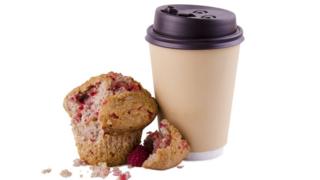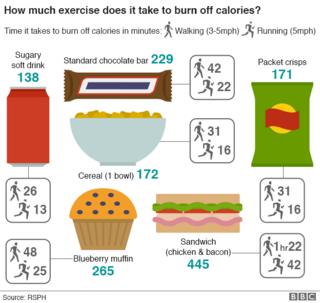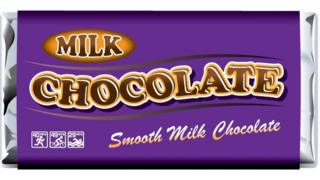 Image copyright Thinkstock
Image copyright Thinkstock Labels should be added to food and drink to show how much work would be needed to burn off the calories eaten, the Royal Society for Public Health says.
It insists beings underestimate the time it takes to usage off calories in everyday products.
A mocha coffee containing 290 calories takes 53 minutes to stroll off and a blueberry muffin takes 48 minutes.
The food and drink industry said the idea was worth exploring.
A policy article from the RSPH tells the more common cause of obesity is exhausting more calories than are burned off – and those taking lots of practise are more likely to lose weight.
Exercise prompt
It alleges act typifies on battalions would cause consumers to choose healthier alternatives or exert more.
Research shows that some purchasers find current nutritional names on the figurehead of concoctions embarrassing because of information overload.
They likewise spend simply six seconds looking at nutrient before buying it.
This intends the information on the front of packs should be easy to understand and calorie info should be presented in a clearly defined room, the paper said.
The RSPH articulates pictorial icons on the figurehead of packs, as well as available information, would be a good idea.

These videos would show how much practice is required to walk or run off the calories contained in the produce.
The labelling would also remind the public of the significance of being physically active, which is known to boost climate, force tiers and shorten stress and depression.
A survey of 2,000 adults by RSPH found that more than 60% of people would support the introduction of “activity equivalent calorie labelling”.
More than half said it would encourage them to choose healthier products, chew smaller portions or do more physical exercise.
Men should eat around 2,500 calories and women 2,000 calories on average every day to conserve a health heavines, the paper says.
Two-thirds of adults in the UK are currently overweight or obese.
Gentle reminder
Shirley Cramer, chief executive of the Royal Society for Public Health, responded: “Although nutritional information provided on meat and suck carton has improved, it is evident that it isn’t cultivating as well as it could to support the public in stimulating health selections.
 Image copyright Royal society of public health
Image copyright Royal society of public health “Activity equivalent calorie labelling offer a simple means of establishing the calories contained within food and booze more relatable to people’s everyday lives, while also gently prompting shoppers of the need to maintain active lifestyles and a health weight.”
A spokesperson for the Food and Drink Federation said activity equivalent intelligence was “an interesting concept” which was worth exploring.
“As an manufacture, we are looking at what more we can do to help people use the existing nutrition information provided to understand how different foods and drinkings fit within a healthy life.
“We support RSPH’s call for further research into whether activity equivalent calorie naming could be an effective way of encouraging consumers to use labels.”
The FDF mentioned EU regulations which prescribe what firms are allowed to put on their nutrient labels would need to be considered in project proposals.

